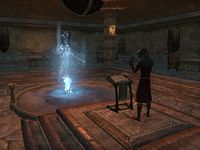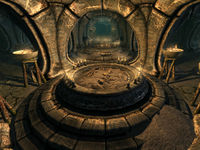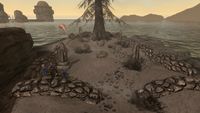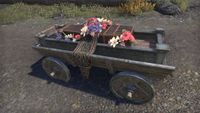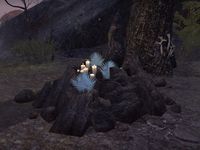Lore:Death/Dunmer
Dunmer Afterlife[edit]
The departed spirits of the House Dunmer, entombed in their ancestral tombs, persist after death. The knowledge and power of departed ancestors benefits the bloodlines of their descendants. The bond between the living family members and immortal ancestors is partly blood, partly ritual, partly volitional.[1][2]
Both House Dunmer and Ashlander do not emphasize the distinction between Mundus, Aetherius and Oblivion. They regard all these planes as a whole with many paths from one end to the other rather than separate worlds of different natures with distinct borders. This philosophical viewpoint may account for the greater affinity of elves for magic and its practices.[1] Dark Elves don't believe that death is the end, but the beginning.[3]
Ancestral tomb-bound spirits will always recognize their own kind, regardless of time passed since the last time they communed with the living. However, if they are angry with their descendants, they may attack them,[4] although even a stranger could gain their trust if first pay the proper respects in the family shrines within the tomb.[5] Spirits do not like to visit the mortal world, and they do so only out of duty and obligation. For them, the otherworld is more pleasant, or at least more comfortable for spirits than Mundus, which is cold, bitter, and full of pain and loss. Some spirits are bound against their wills to protect family shrines. This unpleasant fate is reserved for those who have not served the family faithfully in life. Dutiful and honorable ancestral spirits often aid in the capture and binding of wayward spirits. These spirits usually go mad, and make terrifying guardians. They are ritually prevented from harming mortals of their clans, but that does not necessarily discourage them from mischievous or peevish behavior. They are exceedingly dangerous for intruders. At the same time, if an intruder can penetrate the spirit's madness and play upon the spirit's resentment of his or her own clan, the angry spirits may be manipulated.[1] Certain Dunmer have their skin covered in magic script seen as white tattoos, which are wards against the undead.[UOL 1]
Respect for the departed ones is a central part of Ashlander culture. If an outlander wants to be respected, they should honor them as well.[6]
Dunmer Funerary Customs[edit]
When a Dunmer passes, his body is given to fire, so "he might return to the ash from whence he came".[3]
It is a House Dunmer family's most solemn duty to make sure their ancestor's remains after cremation are interred properly in a City of the Dead such as Necrom. There, the spirits draw comfort from one another against the chill of the mortal world. However, as a sign of great honor and sacrifice, an ancestor may grant that part of his remains be retained to serve as part of a ghost fence protecting the clan's shrine and family precincts. Such an arrangement is often part of the family member's will, that a bone shall be saved out of his remains and incorporated with solemn magic and ceremony into a clan ghost fence. In more exceptional cases, an entire skeleton or even a preserved corpse may be bound into a ghost fence. These remains become a beacon and focus for ancestral spirits, and for the spirit of the remains in particular. The more remains used to make a ghost fence, the more powerful the fence is. And the most powerful mortals in life have the most powerful remains.[1] A necropolis can be created to contain the remains of a group of significance. This was the case for Othrenis, a necropolis that contains the mages that sealed the Brothers of Strife in Stonefalls.[7]
Each House Dunmer family has a shrine. In poorer homes, it may be no more than a hearth or alcove where ancestors' relics are displayed and venerated. In wealthy homes, a room is set aside for the use of the ancestors. The most powerful families possessed ancestral tombs dedicated uniquely to the worship of their ancestors. These shrines are called the Waiting Door, and represents the door to Oblivion. There the family members pay their respects to their ancestors through sacrifice and prayer, through oaths sworn upon duties, and through reports on the affairs of the family. In return, the family may receive information, training, and blessings from the family's ancestors. The ancestors are thus the protectors of the home, and especially the precincts of the Waiting Door.[1]
During the decades between the construction of the Great Ghostfence around the Red Mountain and the rise of the New Temple and the fall of the False Tribunal, there were many changes in the practice of ancestor worship among Dunmer Houses. With the vast majority of ancestors' remains going to strengthen the Great Ghostfence, there remained very few clan ghost fences in Morrowind. The Temple discouraged such practices among the Houses as selfish. The upkeep of family tombs and private Waiting Doors also fell into disfavor. During those years most Dunmer venerated a small portion of their ancestor's remains kept at a local temple.[1] A short time after the Red Year, the traditions came back with the approbation of the New Temple, and new Ancestral Tombs were built.[3]
Ashlanders simply bury their cremated bodies in the ground and mark the place with a cairn, identified by the possessions of the departed. Honored ancestors usually receive offerings, mostly based on the deeds of that particular Dunmer. The Four First Ashkhans (Nalor Ahemmusa, Shadar Erabenimsun, Lammak Urshilaku, and Akami Zainab) were buried in and around Ald'ruhn and had to be ritually honored with specific presents (an ashen fern, an enemy's weapon, the bones of a fallen guar, and a jeweled cuttle).[8] In contrast with House Dunmer, Ashlanders think ancestral tombs tend to go feral in time, because their spirit inhabitants used to be forgotten and suffer imprisoned without the proper communion, so they elude them.[6][9]
Dunmer regard Necromancy upon any of the accepted races as an abomination. However, before the Third Era, it was acceptable to practice it on other races, especially those of slaves. Telvanni mages were especially skilled necromancers.[1] After the outlawing of Necromancy and before the abolition of slavery, Necromancy thrived by taking slaves at a modest rate. Most assumed the slaves escaped or died. However, by the Fourth Era, this situation changed dramatically.[10]
References[edit]
- ^ a b c d e f g Ancestors and the Dunmer
- ^ Canon Llevule's dialogue in ESO
- ^ a b c Elder Othreloth's dialogue in Skyrim: Dragonborn
- ^ Drelyth Hleran's dialogue in ESO
- ^ Dranoth Hleran's dialogue in ESO
- ^ a b Wise Woman Asani's dialogue in ESO
- ^ Garyn Indoril's dialogue in ESO
- ^ Farseer Kuamta's dialogue in ESO
- ^ Ibaal's dialogue in ESO
- ^ Corpse Preparation
Note: The following references are considered to be unofficial sources. They are included to round off this article and may not be authoritative or conclusive.
- ^ Ted Peterson's posts in Playing Houses
|
||||||||||||||||
